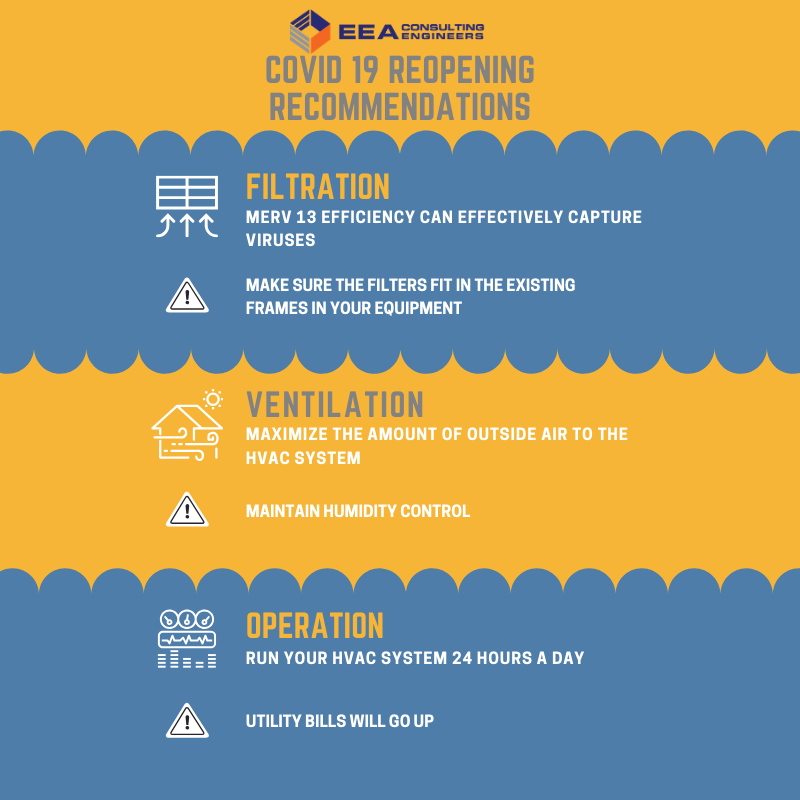
UPDATED: APRIL 2021
Now that states and municipalities have begun to move into different phases of their Stay at Home orders, many businesses are seeing personnel return to the work environment. However, a return to the old “normal” may carry risks that still need to be mitigated, which is why calling in an expert (such as the ones you can see if you click this link) to check your system is critical. Below are some of the recommendations from the American Society of Heating, Refrigerating, and Air-Conditioning (ASHRAE) for improvements to HVAC systems that can help mitigate risks associated with the spread of infection, along with EEA’s notes on things you should consider as part of the implementation process. None of these items are a silver bullet guarantee of safety, but they represent good practice based on the knowledge we currently have, and could be something to consider when getting your systems looked over by One Hour Heating and Air Conditioning or other professionals.
FILTRATION: Upgrade air filters to MERV-13
-
-
WHY – This is the filter efficiency that can effectively capture viruses
-
BEWARE
- It can be difficult to find these filters that will fit a 1″ or 2″ rack, which is common for small commercial equipment.
- Not all MERV-13 filters are created equal! We can help you understand the differences.
- Higher efficiency filters will impose added pressure drop on the system fans and could reduce the airflow capacity of the system and increase energy consumption.
-
VENTILATION: Disable demand control ventilation sequences, and maximize the amount of outside air introduced to the HVAC system
-
-
WHY – This will increase the amount of fresh air delivered to occupied spaces, and reduce the amount of air recirculated throughout the building
-
BEWARE
- Introducing higher amounts of outside air will increase the load on the system, making it difficult for equipment to maintain a leaving air temperature near 55 deg. F. This leaving air temperature is CRITICAL for limiting the relative humidity in the space.
- Increased load on the system will lead to increased utility costs
- Air that comes in must find a way out, so make sure that proper relief air and exhaust air paths are provided to keep from over-pressurizing the building.
- If your system is old then you may need to get it fixed or replaced by using people similar to Denver hvac contractors so that utility costs do not skyrocket.
-
OPERATION: Operate systems 24 hours per day
-
-
WHY – Running the systems continuously, as opposed to setting systems back during unoccupied hours, will increase the effectiveness of the mitigations noted above by turning the air over the filters more and introducing more outside air to the spaces
-
BEWARE
-
Running the HVAC systems 24 hours per day will increase utility costs, especially if your system is old. You might be better off getting your HVAC system restored with the help of DUCTZ of Mid Michigan or similar companies in your area.
-
-
ADD UV-C AND/OR BIPOLAR IONIZATION EQUIPMENT (UL Listed)
-
-
WHY – Research shows that these technologies are effective at killing or neutralizing viruses
-
BEWARE
- The effectiveness of these technologies is VERY dependent on thoughtful implementation specific to the spaces to be treated
- Each technology has potential negative side effects for human exposure, so care must be taken
-
DEFINE & HIGHLIGHT: Health Priority Areas (HPA)
-
-
WHY – Starting costs of new indoor air quality technology and improvement across an entire building is expensive, focus on areas with the largest occupant density
-
BEWARE
-
Be purposeful with filter installation
-
-
Please be aware that there is nothing that can be implemented in a heating and air conditioning system that will eliminate the risks associated with COVID or other contamination. Most heating and air-conditioning systems are designed to thoroughly mix the air in the space, therefore mitigation approaches use a “Dilution is the Solution for Pollution” approach. Do not treat these recommendations as a guarantee about your specific situation, as you should meet with a licensed professional engineer before making any decisions about modifications to any heating and air conditioning systems. We are here to help and are happy to advise you on any questions you may have that can help provide your staff, and your clients’ staff, with as safe a working environment as possible. Contact us today for more information or if you interested in an analysis of your systems, fill out the form below.
info@eeace.com